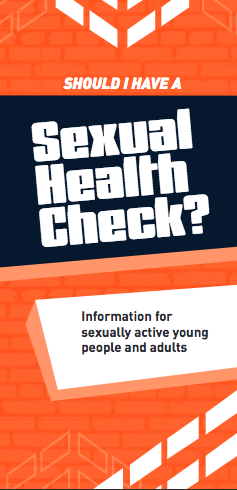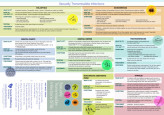You can now add Healthify as a preferred source on Google. Click here to see us when you search Google.
Sexually transmitted infections (STIs) | Mate paipai
Also called sexually transmitted disease (STD)
Key points about STIs
- Sexually transmitted infections (STIs or mate paipai) are infections passed from one person to another through unprotected sex or genital contact.
- Anyone who is sexually active is at risk of getting an STI.
- You can reduce your chances of getting an STI by always using condoms (pukoro ure) with new partners.
- Not all STIs have symptoms, so regular sexual health checks are important.

STIs are infections that can be passed from person to person by:
- having unprotected sex (vaginal, anal or oral)
- genital to genital contact
- oral to genital contact.
Chlamydia is the most common STI in Aotearoa New Zealand but there are many other different types of STIs.
STIs are so common that anyone who has ever had sex could get one. Whether you get one is not about you being good, bad, clean or dirty, but just about being normal and sexually active. You can reduce your chances of getting an STI by always using condoms (pukoro ure) with new partners and having regular sexual health checks.
Video: Sexually transmitted infections - The REAL Sex Talk
(Villainesse, NZ, 2018)
There are many different STIs. The following is a brief description of the most common ones. Click on the links below for more detailed information.
Chlamydia
Chlamydia is the most commonly diagnosed STI in Aotearoa New Zealand. It affects all genders. Most people who have chlamydia don't show any symptoms – but they can still infect other people. Chlamydia can be easily treated with antibiotics. Left untreated, chlamydia can cause infertility.
Read more about chlamydia.
Gonorrhoea
Gonorrhoea is very common. Up to 50% of women and 90% of men who have gonorrhoea don't experience any symptoms and don't know they're infected. It's possible to have a gonorrhoea infection in your urethra (where you pee), rectum (bottom), female reproductive tract (vulva/vagina), mouth, throat or eyes.
For women, gonorrhoea can cause:
- pain or a burning sensation when urinating (peeing)
- a vaginal discharge (often watery, yellow or green)
- pain in your lower abdomen (tummy)
- pain during or after sex
- bleeding between periods
- heavier periods
- bleeding after sex.
For men, gonorrhoea can cause:
- pain or a burning sensation when urinating (peeing)
- a white, yellow or green discharge from the tip of your penis
- pain or tenderness in your testicles.
Read more about gonorrhoea.
Syphilis
Syphilis enters your body through tiny breaks in your skin, mainly in your genital area or mouth. Many people don't get any symptoms and wouldn't know they had syphilis without having a blood test. Treatment is normally with injections of an antibiotic called benzathine penicillin. If left untreated, the syphilis bacteria eventually causes damage to your internal organs. People without symptoms can still develop these problems later if their syphilis is not treated.
Read more about syphilis.
Trichomoniasis
Anyone can get trichomoniasis, but it is more common in people with a vulva/vagina.
If you have a vulva/vagina, the infection can cause a frothy yellow or watery vaginal discharge that has an unpleasant smell, soreness or itching around your vulva, and pain when passing urine (peeing).
If you have a penis, trichomoniasis rarely causes symptoms. You may experience pain or burning after passing urine (peeing), a whitish discharge, or an inflamed foreskin.
Read more about trichomoniasis.
Urethritis
Urethritis is an inflammation of the urethra (the tube you pee from) in a person with a penis. There are many different causes of urethritis and they are not always related to sexual contact. Urethritis is usually caused by chlamydia or gonorrhoea, but occasionally it can be caused by Mycoplasma genitalium, trichomonas, herpes simplex virus or by bacteria commonly found in the throat or rectum. The symptoms of urethritis are pain on urination, irritation, discomfort or discharge.
Read more about urethritis.
Mpox
Mpox is caused by monkeypox virus. It's called ‘monkeypox’ because it was first found in monkeys. Most people recover fully without treatment but in some cases, people can get seriously ill. Mpox does not spread easily between people. The virus is spread by close contact with the lesions, body fluids, respiratory droplets of a person with Mpox. The symptoms of Mpox are a flu -like illness and a characteristic rash generally appears after a few days. It usually starts on the face and then spreads to other parts of the body. It may also appear on the palms of hands and soles of the feet, inside the mouth, or on the genitals. Mpox is usually a self-limiting illness (which means it will get better by itself) with symptoms lasting 2 to 4 weeks.
Read more about Mpox.
Human papillomavirus (HPV) and genital warts
Genital warts are caused by the human papilloma virus (HPV). They appear as small fleshy growths, bumps or skin changes, on or around your genital or anal area. The warts are usually painless, but you may notice some itching or redness. Sometimes, they can cause bleeding. You don't need to have penetrative sex to pass the infection on because HPV is spread by skin-to-skin contact. Several treatments are available for genital warts, including creams and freezing the warts (cryotherapy). Most HPV is subclinical which means you may ne get any symptoms and often your body's immune response will clear the virus without any treatment being needed.
There is now a vaccine available that protects against HPV including the types that cause genital warts. It's recommended to be given at age 11 to 12 years but is free in Aotearoa New Zealand for anyone from 9 to 26 years of age.
Some types of HPV (not the ones that cause warts) can also lead to changes on your cervix, throat and rectum which may (if left undetected) eventually turn into cancer.
Read more about human papilloma virus (HPV), HPV vaccine and genital warts.
Genital herpes
Genital herpes is a common skin infection caused by a virus known as the herpes simplex virus (HSV).The symptoms of genital herpes are similar to cold sores found on your mouth, except they appear on your genital skin. Small, painful blisters or sores usually develop, which may cause itching or tingling, or make it painful to urinate (pee). In the first episode the lesions may last up to 3 weeks (in severe cases) but if it recurs the lesions usually take 3 to 7 days to heal. After you've contracted genital herpes, the virus can remain dormant (inactive) and certain triggers can reactivate the virus, causing the blisters to develop.
Most people with genital herpes don’t have any symptoms. You are most likely to pass on the virus when you are symptomatic (have symptoms) and sexual contact should be avoided during this time. Occasionally the virus can be passed on by people with no symptoms. Genital herpes can't be cured;, but symptoms can be managed very effectively with antiviral medicines.
Read more about genital herpes.
Hepatitis B
Hepatitis B is a viral infection that causes inflammation of your liver. Some people don't have any symptoms, but others can have symptoms such as:
- feeling sick or vomiting
- lack of appetite
- flu-like symptoms (such as tiredness, general aches and pains or headaches)
- abdominal (tummy) pain
- clay-coloured bowel motions and/or dark-coloured urine
- yellowing of your skin and eyes (known as jaundice).
One of the most effective ways to avoid getting hepatitis B is to get immunised with the hepatitis B vaccine. Read more about hepatitis B.
Human immunodeficiency virus (HIV)
HIV is caused by the human immunodeficiency virus which causes damage to your body's immune system and impairs your ability to fight disease-causing organisms. HIV is most commonly passed on through unprotected sex. Without treatment, some people with HIV may develop the potentially life-threatening condition known as acquired immunodeficiency syndrome (AIDS). There's no cure for HIV, but there are treatments that allow most people to live a long and otherwise healthy life. There are also preventative measures available such as pre-exposure prophylaxis (PrEP) to reduce the risk of contracting HIV.
Read more about HIV.
Pubic lice
Pubic lice, also called crabs, are usually found in pubic hair but can live in your underarm hair, body hair, beards and sometimes eyebrows or eyelashes. They are easily passed to others through close genital contact. The lice crawl from hair to hair but don't jump or fly from person to person. It may take several weeks for you to notice any symptoms. Most people experience itching, and you may notice the lice or eggs on your hairs. Pubic lice are treated with special creams, lotions or shampoos available from your pharmacy or your healthcare provider. You don't need to shave off your pubic hair or body hair.
Read more about pubic lice.
Molluscum contagiosum
Molluscum contagiosum is a skin infection caused by the molluscum contagiosum virus (a pox virus). It causes small firm skin-coloured bumps (lesions) with waxy white centres that can appear anywhere on your body but are common on the genitals (groin area), thighs or lower tummy. They can be confused with genital warts or pimples. It usually affects children, sexually active adults and people with a suppressed immune system. Because of their appearance they can be confused with genital warts or pimples. The bumps don’t usually cause pain, but they can sometimes be itchy. They usually appear within about 2 to 3 months after you become infected. Without any treatment they can stay there for 6 months to 2 years. For most people they will clear up within a year (without treatment).
Read more about molluscum contagiosum.
Simple ways to have safer sex include using condoms with new partners and making sure you have a reliable method of contraception if you do not want to get pregnant. Drinking less alcohol and avoiding recreational drugs will also tend to mean you act more safely. Learn more about safer sex.
Not all STIs have symptoms. You can have an STI without even knowing as sometimes the symptoms are so small, especially in the early stages. Because there are many different STIs, the symptoms vary. Some of the general symptoms include:
- unusual discharge from your penis or vagina
- itch or rash on or around your genitals
- lumps, blisters or sores on or around your genitals
- pain in your genital area or groin
- pain in your penis or vagina when having sex
- pain or a burning sensation when passing urine (peeing).
If you have more than 1 partner, are starting a new relationship or have recently had sex with someone new, a sexual health check or STI test is a really great idea. A sexual health check should also be part of a regular health check.
You can be tested for STIs at a sexual health clinic, Sexual Wellbeing Aotearoa clinic or by your GP.
Video: Dr Cathy Stephenson tells us why we should get tested for STIs
(Just the Facts, NZ, 2019)
It's a really good idea to get tested for an STI:
- if you have had unprotected sex (vaginal, anal or oral)
- if you know your current or past partner has or has had an STI
- before you begin a new relationship
- if a condom broke – get tested a few weeks later and get some tips to make sure condoms are much less likely to break next time
- as part of a general health check-up
- if you have symptoms or just feel something isn’t quite right
- if you or your partner have shared needles for drugs, tattooing or piercing.
At a sexual health check, your nurse or doctor will ask a few basic questions about your sexual history such as the following:
- How long since your last STI check?
- Do you have any symptoms?
- Have you had a recent change of partner?
- What types of sex have you had (some sexual activity is higher risk than others)?
These questions help them understand what tests you need. These may include the following tests:
- A urine test – when your pee is collected in a pot.
- Swabs – a cotton bud with a long handle is used to take a sample from your vulva, urethra or anus (depending on the STI being tested for). Often the doctor or nurse can explain to you how to take the swabs yourself and you can ask about this option if you feel more comfortable that way.
- A physical check – the nurse or doctor will look at your genital area for any sign of infection.
- A blood test.
Note: You can only be tested for genital herpes if you have symptoms, testing for herpes is not part of a routine sexual health check.
If you have an STI, it's important to tell your partner, so they can be tested and treated as well. This reduces the spread of the STI and lessens your chance of getting it back again. It's best to tell your partner as soon as possible after finding out that you have an STI and before having sex with an untreated partner.
Some people find the experience of telling their partner awkward and difficult. If so, talk to your doctor or nurse, or contact your local sexual health clinic, or a Sexual Wellbeing Aotearoa clinic for guidance. There's also some guidance available on the Burnett Foundation website(external link).
STIs will not go away by themselves, so if you get one you need to get it treated. If left untreated some STIs can be a serious health risk and can cause other conditions such as:
- pain and inflammation in your genital area
- pelvic inflammatory disease (PID) in women and epididymitis in men
- infertility
- cancers of your reproductive system.
Having an STI during pregnancy can harm your baby. Gonorrhea and chlamydia can both cause health problems in your baby – ranging from eye infections to pneumonia. Syphilis may cause miscarriage or stillbirth. HIV infection can occur in a baby. If you contract herpes during pregnancy this may also affect your baby and it's advisable to talk to your lead maternity carer (LMC) about the best way to manage this.
If you're pregnant and you or your partner have had – or may have – an STI, it's important to tell your healthcare provider. Your baby may be at risk. Tests for some STIs are offered routinely during prenatal care. It is best to treat the STI early to decrease the chances that your baby also will get the infection. You and your partner both may have to be treated.

Image credit: Canva
The following links provide further information about STIs. Be aware that websites from other countries may have information that differs from New Zealand recommendations.
Just the facts on STIs(external link) Just the Facts, NZ
What are the symptoms of STIs?(external link) Just the Facts, NZ
Sexually transmissible infections(external link) Sexual Wellbeing Aotearoa, NZ
Sexually transmitted infections (STIs)(external link) Auckland Sexual Health Service, NZ
STI facts(external link) Healthy Sex, NZ
Organisations with a cultural focus
Village Collective(external link) Empowering Pasifika youth through sexual and reproductive health education.
Shakti International(external link) A website providing culturally competent support services for women, children and families of Asian, African and Middle Eastern origin.
Brochures
A compact guide to sexual health(external link) HealthEd, NZ, 2010
Should I have a sexual health check?(external link) HealthEd, NZ, 2010
Sexually transmitted infections (STIs)(external link) Sexual Wellbeing Aotearoa, NZ
Sexual health leaflets(external link) STIEF, NZ
References
- Sexually transmitted infections prevention(external link) NZ Sexual Health Society
Clinical guidelines and resources
STI management guidelines for use in primary care(external link) Sexual Health Society, NZ
Sexual health check overview(external link) Sexual Health Society, NZ
Gonorrhoea guideline(external link) Sexual Health Society, NZ, 2017
Emerging issues in the management of chlamydia and gonorrhoea(external link) BPAC, NZ, 2019
Syphilis rates continue to rise(external link) BPAC, NZ, 2019
Guidelines for the management of genital, anal and throat HPV infection in New Zealand(external link) STIEF, NZ, 2024
Guidelines for the management of genital herpes in Aotearoa New Zealand(external link) STIEF, NZ, 2024
Mycoplasma genitalium – considerations for testing and treatment in primary care(external link) BPAC, NZ, 2019
Treatment of sexually transmitted and other genital infections(external link) BPAC, NZ, 2009
Continuing professional development
Podcast
What's new in sexual health – Dr Nicky Perkins(external link) Goodfellow Unit, NZ, 2019
Video and webinar
Sexual health and sexually transmitted diseases (external link)(Mobile Health, NZ, 2020)
Infectious disease and sexual health(external link) (Mobile Health, NZ, 2019) Dr Massimo Giola talks about major changes and recent updates for the treatment of sexually transmitted infections in the Goodfellow Symposium 2019.
Brochures

HealthEd, NZ, 2010

Health Ed, NZ, 2010

Family Planning, NZ, 2024
Credits: Healthify editorial team. Healthify is brought to you by Health Navigator Charitable Trust.
Reviewed by: Katie McCullough, Nurse Practitioner, Clinical Lead, STIEF
Last reviewed:





